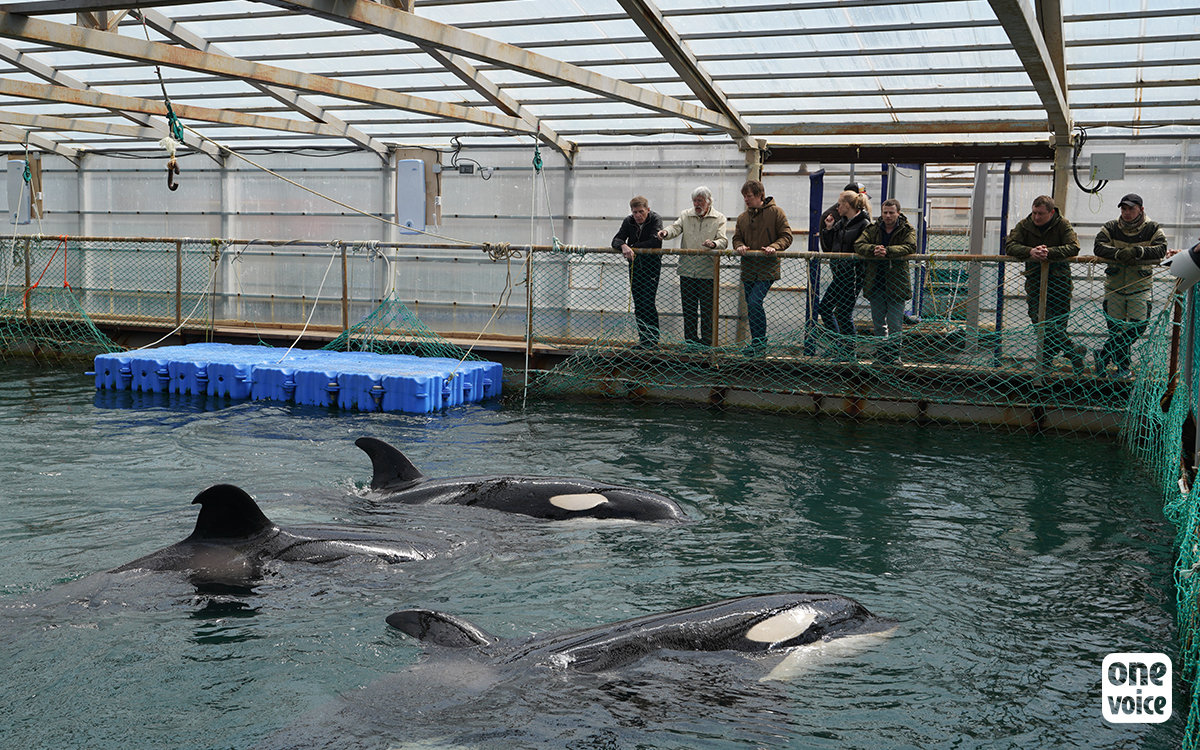

Orcas and belugas trapped in Russia: hope is reborn!
Relief! An international scientific expedition, supported by One Voice, visited Russia in early April. Eminent experts in marine mammals have gathered around Jean-Michel Cousteau, they have been able to launch a cooperation program to save orcas and beluga whales captive in the Srednyaya bay.
Unfortunately, it will take a long time, but it is now a certainty: the 97 orcas and belugas illegally captured in the Sea of Okhotsk and sequestered in the Srednyaya Bay, in the Russian Far East, have now a real chance of regaining their freedom! Despite pressure to protect the four companies that appropriated them, local activists have worked tirelessly to alert the international community and to secure the movement of leading experts in the support of these endangered animals who are in great suffering. All of this has been achieved with the consent of the Russian authorities !
International shipping
Engaged in this collective fight since the revelation of this affair and its many twists and turns, having helped to lead a team of experts, we are very happy to be a part of this expedition. The expedition team leader is Jean-Michel Cousteau of the Ocean Futures Society and Charles Vinick of the Whale Sanctuary Project – to Russia has been the organizer from April 3 to 11.
Thank you so much, @onevoiceanimal, for being part of our international effort to free 97 captive orcas and belugas from “whale jail” in Russia and return them to the ocean. #WhaleAid https://t.co/gXm95BTSHp
— Whale_Sanctuary (@Whale_Sanctuary) 10 avril 2019
Their mission: to assess the condition of the 10 orcas and 87 belugas locked up in an open-air prison and to advise the government on a rehabilitation program with a view to their return to the ocean. There is an urgent need to rescue them, because since the start of
this series of captures in July 2018, four of these unfortunates have already gone “missing” !
Joint declaration
This visit allowed a giant step in the coordination and development of the rescue project. Jean-Michel Cousteau and Charles Vinick agreed with Oleg N. Kozhemyako, the governor of the Primorsky region where the prisoners are kept, around a joint declaration. The agreement plans to immediately begin work to keep marine mammals in conditions close to their original environment, while also planning the creation of a re-education and rehabilitation centre for the injured. He also claims to pursue, ultimately, the goal of freeing them all! We will make sure of it.
Russian and international scientists from the Cousteau team will therefore continue to assess individuals to determine when and how to release them. The New Zealand biologist Ingrid Visser, who was on the trip and who saw at first-hand the urgent need to intervene, is delighted with this tremendous advance:
«It was extremely distressing to see the orcas and belugas so detained, but I am relieved to know that the governor of the Primorsky region where they are being held signed an agreement to rehabilitate them before releasing them.»
Long-term cooperation
Why not release these suffering mammals immediately? Because their nine months of detention requires them to readjust to an independent and wild life. The cold, the stress, the break-up of family cells and the captivity in artificial groups upset all their social references and has weakened them both physically and mentally. Today, we must therefore try first to cure them of the shock they suffered and create conditions favourable to their release.
Lori Marino, president of the Whale Sanctuary Project, stresses the importance of addressing each of them individually, at their own
pace :«Each of the 87 belugas and 10 orcas is an individual and each of them has faced the trauma of capture and sequestration in a unique and individual way. In this aspect, they are really like us. Thus, each of them must be taken care of individually to assess their mental and physical health and what they need.»
Because, even if the lovers of dolphinariums continue to struggle to convince themselves that there is no problem, it remains clear that orcas and belugas are like us. Emotionally gifted, endowed with high intelligence and possess real cultures, it is up to us to protect each of them in their specificity, their own history and their unique psychology !